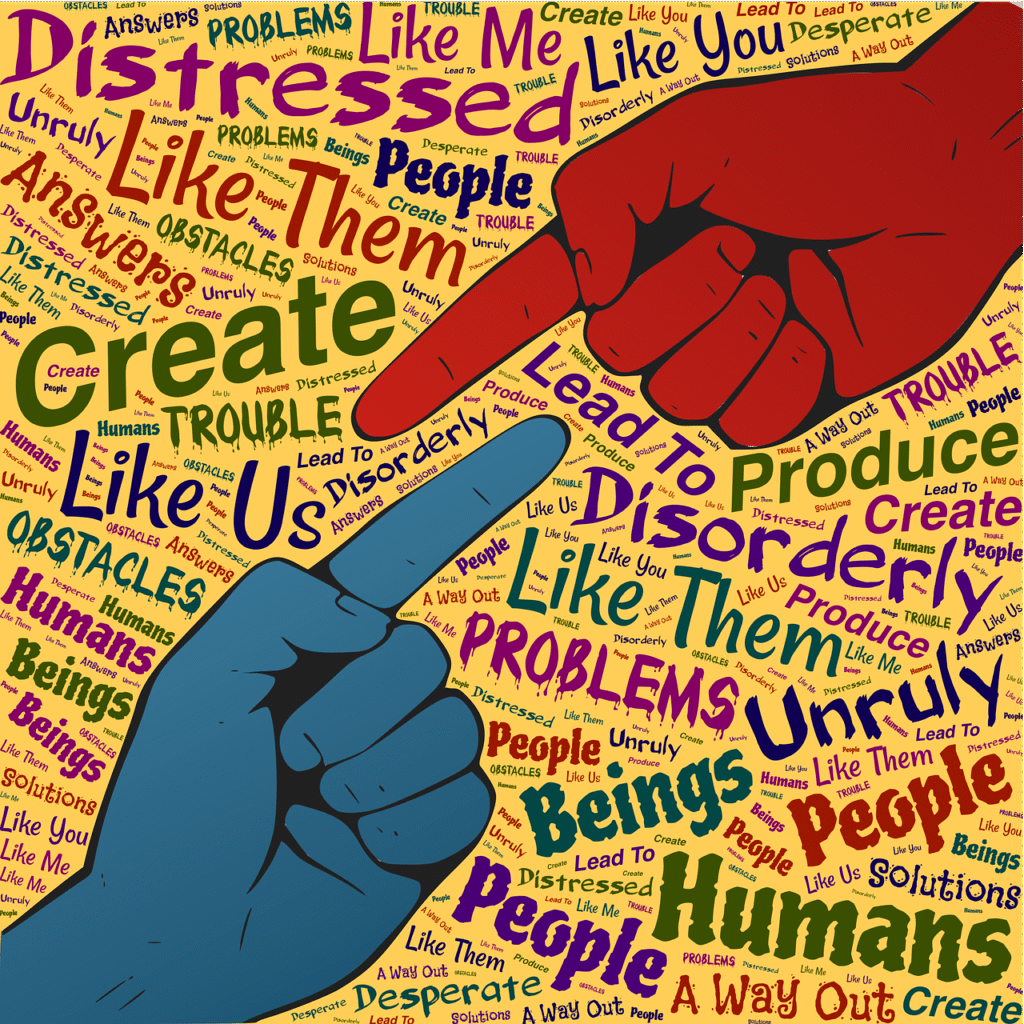The Blame Game and the Scapegoat Game
The “Blame Game” is a pattern of behaviour where people avoid taking responsibility for problems, mistakes, or bad feelings by finding someone else to blame. This often happens when something goes wrong and, instead of working together to solve the issue or learn, people start pointing fingers; sometimes to escape punishment, sometimes to protect their Ego, or just because that’s the pattern they learned from others. It can happen between friends, in families, in classrooms, and all the way up through workplaces, governments, and even on the world stage. frontiersin
The Blame Game vs. The Scapegoat Game
| Aspect | Blame Game | Scapegoat Game |
|---|---|---|
| Core pattern | Shifting responsibility away from oneself | Targeting an individual/group to carry collective blame |
| How it works | Everyone tries to avoid being “at fault”; blame shifts rapidly | A person (or group) is blamed for everything, even unfairly |
| Example contexts | Sibling arguments, classroom drama, work mistakes | Family dysfunction (“black sheep”), school bullying, company Meltdowns, societal crises |
| Emotional impact | anxiety, mistrust, cycles of denial | Isolation, shame, long-term damage for the scapegoat |
| Societal levels | Can happen at any level, from personal to global | Used socially and politically to unite majority by sacrificing a minority |
Scapegoat Game: Follows when the group or authority picks a specific person (or group) to consistently receive the blame, even for issues beyond their control or unrelated to them. Over time, everyone learns to join in or look away, so the pattern stays hidden and powerful. frontiersin
Advice for Potential Targets
Recognize Patterns: Notice if blame is flying around with no real effort to solve problems. Or if you’re getting blamed more often than makes sense.
Stay Grounded in Facts: Keep track of what really happened, what you were responsible for, and what is not yours to carry.
Seek Support: Find friends, trusted adults, or mentors outside the blaming circle. Isolation is the scapegoater’s best tool, but the community is yours too.
Set boundaries: If possible, say clearly what you will and won’t take responsibility for. (“I’ll own what I did, but not what I didn’t.”)
Protect Your Self-Worth: Remember, if you’re always the one being blamed, it’s about a system or pattern—not your real value.
Reach Out for Help: In severe cases, involving adults, counsellors, or outside authorities may be necessary, especially when bullying or abuse is involved. frontiersin
Are These Games Played Everywhere?
Yes, unfortunately, both the Blame Game and the Scapegoat Game happen at all levels of society. They show up in:
-
Families (blaming a “problem child”)
-
Schools (picking on the “odd one out”)
-
Workplaces (singling out an employee for systemic failures)
-
Politics and media (blaming groups for complex social problems)
-
Internationally (nations or leaders casting blame to unite or distract populations)
They persist because they temporarily reduce anxiety, uncertainty, or shame for the majority, but almost always at a terrible cost to individuals and social trust. frontiersin
The Blame Game and Scapegoat Game are cycles of blame-shifting and collective targeting that can happen anywhere—from playgrounds to boardrooms to politics. Recognizing the patterns, protecting yourself with support, boundaries, and self-respect, and refusing to accept unfair blame are the best ways to resist being caught in these dynamics. Remember: real solutions never come from blame, but from honesty, empathy, and shared effort. frontiersin
Reference
Frontiers in Psychology, 2019. The Coping Circumplex Model: An integrative Model of the Structure of Coping With stress. frontiersin
https://www.frontiersin.org/articles/10.3389/fpsyg.2019.00694/pdf



0 Comments